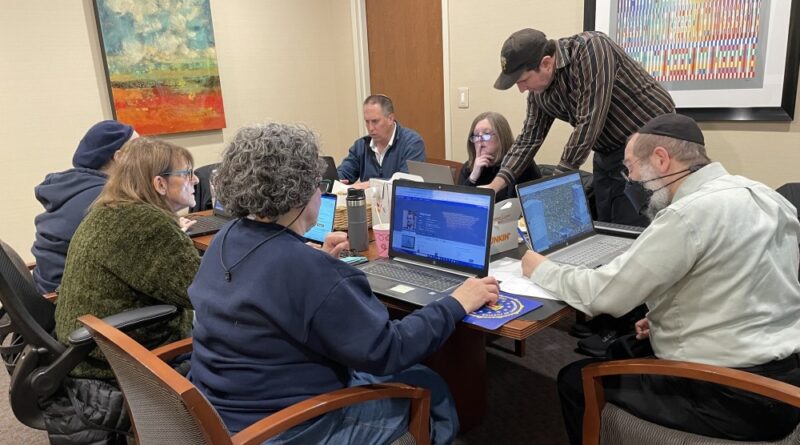“It is not your responsibility to finish the work, but neither are you free to desist from it.”—Pirkei Avot (Ethics of the Fathers)
The Jewish Cemetery Association of Greater Baltimore recently embarked on what you might call “a monumental mitzvah“: to catalog and index all of the Jewish cemeteries and graves in the area for its digital database.
The goal is to eventually help Jewish families locate all of their relatives and descendants interred in the Baltimore metropolitan region.
A program of The Associated: Jewish Federation of Baltimore, the JCA is conducting the cataloging project in conjunction with Sol Levinson & Bros., Pikesville’s Beth El Synagogue and other congregations. Volunteers came together on a recent afternoon at Levinson’s Pikesville location to work on the project and learn research methodologies.
“As this is a long-term project, we welcome as much help as possible,” the JCA posted on social media, thanking volunteers for their time and service.
Helping to lead the project is Dr. Don Engel, a JCA board member and an assistant professor of computer science and electrical engineering at the University of Maryland-Baltimore County. Two years ago, Engel got involved in documenting Jewish gravesites as part of an independent cleanup project at United Hebrew Cemetery in Halethorpe with UMBC’s Hillel chapter.
“I became interested in applying computer-vision processing with photos taken by drones,” he said. “It’s an interesting challenge for me. I’m interested in how humans can interface better using technology, and I wanted to see how collaborative processing could work for historical data.”
So far, Engel has created aerial maps of United Hebrew and the Bowleys Lane Cemetery in Rosedale through drone usage, 3-D mapping and photo identification.
“I’ve tried to focus on the oldest [cemeteries] first because they’re less likely to have a digital imprint,” he said. “My individual interest is in the historical. But from the JCA perspective, it’s to create as complete a mapping of the cemeteries as possible.”

Engel noted that many of the area’s historical Jewish cemeteries have fallen victim to the hands of time.
“A lot of the older stones are on grounds that shift or need to be reseeded due to time and overgrowth, weather and antisemitism,” he said. “The stones don’t always tell the whole story, or are hard to read. At historical cemeteries over a century old, it’s a slow deterioration. The stones fall over, but it’s happening slow enough that we can go back and view the changes on a time-scale through aerial mapping.”
Engel said he joined forces with the JCA to create the database and cataloging initiative.
“The JCA wanted to do an indexing of the cemeteries that they inherited,” he said. “The JCA has been the nonprofit umbrella that absorbed cemeteries that required new stewardship, and they’re doing an amazing job.”
Besides drones and academic mapping, Engel said volunteers are using obituary archives, death certificates, the Find a Grave and myriad family tree websites, and other resources — as well as data from the Jewish Museum of Maryland and the Jewish Genealogical Society of Maryland — to help document local Jewish graves.
About 30-40 volunteers also help with the indexing process on the ground by removing overgrowth and fixing or documenting gravestones at cemeteries.
“For photographing and restoration, it has to be on the ground,” Engel said. “But indexing can be done from home. Every little bit we do is immediately available for the project. What we’re doing is having an impact already.”
Engel admits that researching and cataloging graves can be a morbid and occasionally disturbing activity.
“There are some heart-wrenching stories — murder victims, deaths of heroes, so many stories from our community,” he said. “Doing the research and being there is intrinsically morbid. So many awful things you read about. You think of all that loss. Every once in a while, I have to stop and work on other things. This is not work for everyone.”
Engel said what compels his interest in the project is knowing that so many Jewish cemeteries in Europe were often destroyed, desecrated or profoundly neglected.
“This could happen anywhere, and I worry that this could happen here,” he said. “Digitization is one way of inoculation against the ravages of time. … My hope is that this project will continue and scale up. Volunteers will accelerate the movement. If you can do it in a communal way, it helps a lot.
“Cleaning up a cemetery alone is creepy and sad,” Engel said. “But doing it with others makes it more of a living thing. Having more volunteers involved is a lifeblood of its own.”
For information about the project, contact Steve Venick, executive director of the JCA, at Steve@jcabaltimore.org or visit jcabaltimore.org/#about.





